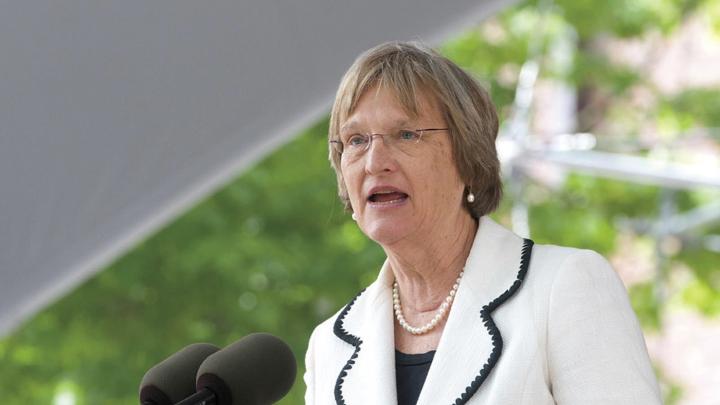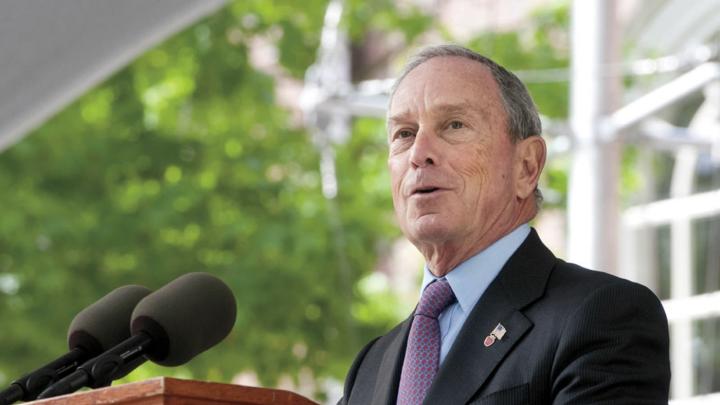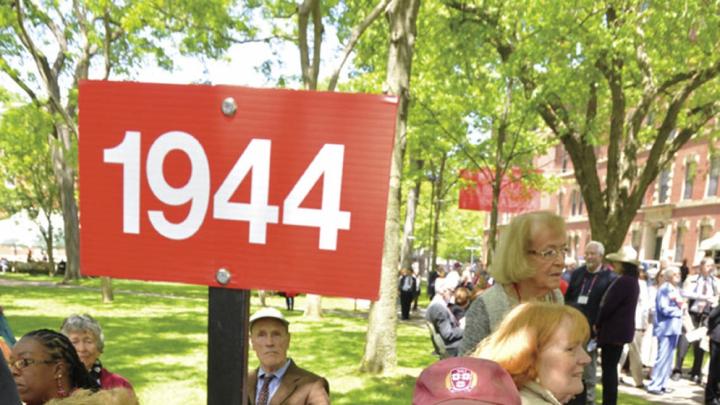President Drew Faust and honorand Michael R. Bloomberg presented differing, yet complementary, views on the idea of a university and of universities’ ideas today. Faust reprised themes from her installation and Harvard Campaign addresses to outline the academy’s role in advancing discovery and meaning. Bloomberg focused less on that ideal than on perceived threats to it. There were plenty of lighter moments during the week, too. And a seventieth-reunion class report anchored the enterprise of learning in its most human context, dating from World War II. For reports on all the principal addresses, visit www.harvardmagazine.com/commencement.
Answers. Questions. Meaning.
President Faust set the stage for her remarks by summoning Tercentenary Theatre’s storied history, then turned to her current concern:
…our accountability to the future, because these obligations must be “our compass to steer by,” our common purpose and our shared commitment. What does Harvard—what do universities—owe the future?
She detailed three answers to her own question:
First, we owe the world answers.
Discovery is at the heart of what universities do. Universities engage faculty and students across a range of disciplines in seeking solutions to problems that may have seemed unsolvable, in endeavoring to answer questions that threaten to elude us. The scientific research undertaken today at Harvard, and tomorrow by the students we educate, has a capacity to improve human lives in ways virtually unimaginable even a generation ago.
Second, she continued, “we owe the world questions.” She expanded:
Just as questions yield answers, answers yield questions. Human beings may long for certainty, but, as Oliver Wendell Holmes put it, “certainty generally is illusion, and repose is not the destiny of man.” Universities produce knowledge. They must also produce doubt. The pursuit of truth is restless. We search for answers …by finding the right questions—by answering one question with another question, by nurturing a state of mind that is flexible and alert, dissatisfied and imaginative.…In an essay in Harvard Magazine, one of today’s graduates, Cherone Duggan [a former Ledecky Undergraduate Fellow at the magazine], wrote about what she called seeking “an education of questions.” I hope we have indeed given her that.
Such questions, she said, “are also the foundation for a third obligation that we as a university owe the future: we owe the world meaning”:
Universities must nurture the ability to interpret, to make critical judgments, to dare to ask the biggest questions, the ones that reach well beyond the immediate and the instrumental.…
We find many of these questions in the humanities: What is good? What is just? How do we know what is true? But we find them in the sciences as well. Can there be any question more profound, more fundamental than to ask about the origins of the universe? How did we get here?
Questions like these can be unsettling, and they can make universities unsettling places. But that too is an essential part of what we owe the future—the promise to combat complacency, to challenge the present in order to prepare for what is to come. To shape the present in service of an uncertain and yet impatient future.
Tolerance and Freedom
Michael R. Bloomberg talked about the open exchange of diverse ideas—and threats he perceived to that bedrock value, of late in academia, and more generally in the nation’s politics. An edited version of his text appeared as a Bloomberg View the same afternoon, titled “Don’t Major in Intolerance.” This excerpt comes from the first half of his argument.
Universities lie at the heart of the American experiment in democracy. They are places where people of all backgrounds and beliefs can come to study and debate their ideas freely and openly.…
Tolerance for other people’s ideas and the freedom to express your own are inseparable values. Joined, they form a sacred trust that holds the basis of our democratic society. But that trust is perpetually vulnerable to the tyrannical tendencies of monarchs, mobs, and majorities. And lately, we have seen those tendencies manifest themselves too often, both on college campuses and in our society.…
Our union…rests on the union of…freedom and tolerance. And it is that union of values that the terrorists who attacked us found most threatening. To them, we were a God-less country. In fact, there is no country that protects the core of every faith and philosophy—free will—more than the United States.
That protection, however, rests upon our constant vigilance.…to ensure that equality under the law means equality under the law for everyone.…You may find my actions immoral or unjust, but attempting to restrict my freedoms, in ways that you would not restrict your own, leads only to injustice.
Throughout history, those in authority have tried to repress ideas that threaten their power, their religion, their ideology or their re-election chances.…
We cannot deny others the rights and privileges that we demand for ourselves; that is true in cities, and it is no less true at universities, where the forces of repression appear to be stronger now than they have been since the 1950s.…
In the 2012 presidential race, 96 percent of all campaign contributions from Ivy League faculty and employees went to Barack Obama. That statistic, drawn from Federal Election Commission data, should give us pause….When 96 percent of faculty donors prefer one candidate to another, you have to wonder whether students are being exposed to the diversity of views that a university should offer.…
[T]he whole purpose of granting tenure to professors is to ensure that they feel free to conduct research on ideas that run afoul of university politics and societal norms. When tenure was created, it mostly protected liberals whose ideas ran up against conservative norms.
Today, if tenure is going to continue to exist, it must also protect conservatives whose ideas run up against liberal norms. Otherwise, university research will lose credibility. A liberal arts education must not be an education in the art of liberalism.
This spring, it has been disturbing to see a number of college commencement speakers withdraw, or have their invitations rescinded, after protests from students and—to me, shockingly—from senior faculty and administrators.…
In each case, liberals silenced a voice…they deemed politically objectionable.
As a former chairman of Johns Hopkins, I believe that a university’s obligation is not to teach students what to think, but to teach students how to think. And that requires listening to the other side, weighing arguments without prejudging them, and determining whether the other side might actually make some fair points.
If…students graduate with ears and minds closed, the university has failed both the student and society. If you want to know where that leads, look no further than Washington.
In Washington…the two parties decide…questions not by engaging with one another, but by trying to shout each other down, and by trying to repress and undermine research that runs counter to their ideology. The more our universities emulate that model, the worse off we will be.…
The Scribe Sums Up
Dan H. Fenn Jr. helped compile the College class of 1944’s first report in 1947, when they began on a three-year cycle (versus five years today); it opened with a dedication page listing the 30 classmates “who left the Yard to serve their country and their kind and gave their lives in the fulfillment of that great responsibility.” Sixty-seven years on, Fenn, still class secretary, submitted the class’s fifteenth reunion report. Taking stock of 70 years , he found:
Around 100 of us became lawyers, and of those perhaps a dozen were judges at various levels. By contrast, well over 150 of us went into business, including many of our Ph.D.s…in various fields of research.…There were around 120 doctors…some dentists, and at least one veterinarian.
In the Harvard tradition, we had around 20 ministers and just short of 100 professors and roughly 20 teachers….Around 35 of us spent the bulk of our careers in government, with the CIA and the Foreign Service dominating. About a dozen of us were career military; nearly 20 spent their lives in nonprofit organizations.…
Many of us had several careers, some at the same time like the man who, while engaged in his business career, taught and played music professionally.…
Five of us…won the Nobel Prize. That is really amazing…Phil Anderson, Merton Miller, George Saxton, Lloyd Shapley, and Bob Solow—can you believe it?
…[T]he term “paradigm shift”…came from one of our classmates in a seminal book on scientific revolutions.…We can boast of…the creator of the practice of daily intelligence briefings for presidents, at least two renowned composers, a couple of boat builders, a rancher, a baker, and a barber, the architect of the Capitol…and a courageous key early leader of the Civil Rights movement.
We can talk about one of the nation’s first househusbands…several producers and publicists for Broadway shows, a notorious Manhattan Project spy…a leading judge of national, international, and Olympic figure skating…the editor of the International Herald Tribune, a vintner in Switzerland, and a metallurgist with over 25 patents who is responsible for a great many of the items we use on earth and in space today….
In the meantime, we managed to produce perhaps 2,500 sons and daughters—one of us had 14, another 11.
So, in the final analysis, I think we did all right!










